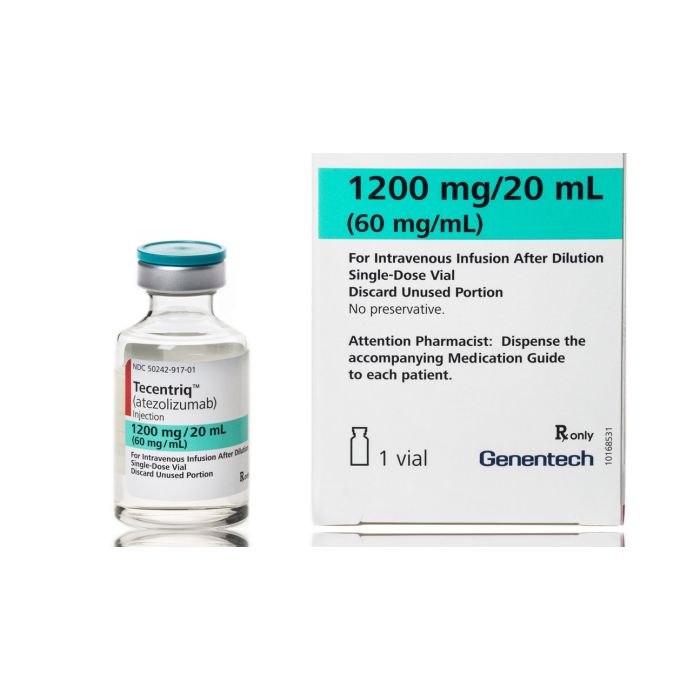Description
What is Tecentriq (atezolizumab) for?
Tecentriq (atezolizumab) is a programmed death-ligand 1 (PD-L1) blocking antibody indicated for the treatment of patients with:
- locally advanced or metastatic urothelial carcinoma who have either; disease progression during or following platinum-containing chemotherapy, or within 12 months of neoadjuvant or adjuvant treatment with platinum-containing chemotherapy[1] or are not eligible for cisplatin chemotherapy[4].
- metastatic non-small cell lung cancer (NSCLC) whose disease progressed during or following platinum-containing chemotherapy[1,5].
- plus nab-paclitaxel (chemotherapy) for unresectable locally advanced or metastatic triple-negative breast cancer (TNBC) whose tumours have PD-L1 expression[10].
How does Tecentriq (atezolizumab) work?
Tecentriq (atezolizumab) belongs to a class of immunotherapy drugs known as checkpoint inhibitors.
The drug prevents a protein called PD-L1 that is found on some tumour cells from binding to another protein, PD-1, on immune cells. The binding of these “checkpoint” proteins suppresses the immune response[2]. Tecentriq (atezolizumab) is a monoclonal antibody that binds to PD-L1 and blocks its interactions with both PD-1 and B7.1 receptors[1]. By blocking this interaction, checkpoint inhibitors “release the brakes” on the immune system, allowing immune cells to attack tumours[2].
Is Tecentriq (atezolizumab) approved?
Tecentriq (atezolizumab) was approved by:
- Food and Drugs Administration (FDA) (USA)
- on May 18, 2016, for locally advanced or metastatic urothelial carcinoma, with disease progression on or after prior chemotherapy[2]. On April 17, 2017, the FDA extended the approval to the use of Tecentriq (atezolizumab) as front-line treatment for advanced or metastatic urothelial carcinoma in patients who are not eligible for cisplatin chemotherapy[4].
- on October 18, 2016, for metastatic non-small cell lung cancer (NSCLC)[3].
- Health Canada on April 12, 2017
- for locally advanced or metastatic urothelial carcinoma, with disease progression on or after prior chemotherapy[8].
- for the first-line treatment of adult patients with extensive-stage small cell lung cancer (ES-SCLC) in combination with carboplatin and etoposide[8].
- for the first-line treatment of adult patients with metastatic non-squamous non-small cell lung cancer (NSCLC) in combination with bevacizumab, paclitaxel and carboplatin[8].
- for adult patients with locally advanced or metastatic NSCLC with progression on or after platinum-based chemotherapy[8].
- Therapeutic Goods Administration (TGA) (AUS)
- on July 27, 2017, for metastatic non-small cell lung cancer (NSCLC)[5].
- European Medicines Agency (EMA) (EU)
- on September 22, 2017, for locally advanced or metastatic non-small cell cancer (NSCLC) and metastatic urothelial carcinoma (mUC) on patients who have been previously treated with a platinum-based chemotherapy and as front-line treatment for advanced or metastatic urothelial carcinoma in patients who are not eligible for cisplatin chemotherapy[6].
- on August 29, 2019, in combination with nab-paclitaxel for advanced TNBC in patients who have not been previously treated with chemotherapy for metastatic disease[10].
- Medsafe on February 14, 2019
- for first-line treatment of patients with metastatic non-squamous NSCLC who do not have tumour EGFR or ALK genomic aberrations[9].
- for the treatment of adult patients with locally advanced or metastatic non-small cell lung cancer (NSCLC) after prior chemotherapy[9].
- for the first-line treatment of patients with metastatic non-squamous non-small cell lung cancer (NSCLC)[9].
- for the treatment of adult patients with locally advanced or metastatic urothelial carcinoma[9].
How do I take Tecentriq (atezolizumab)?
Complete information about Tecentriq (atezolizumab) dosage and administration can be found in the references section[1,5,7].
The recommended therapy consists of:
- 1200 mg as an intravenous infusion over 60 minutes every 3 weeks.
- Dilute prior to intravenous infusion.
Consult your treating doctor for personalised dosing.

Reviews
There are no reviews yet.